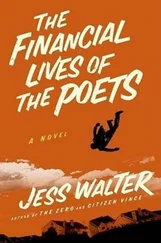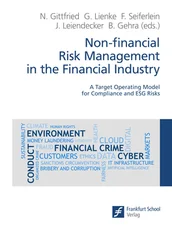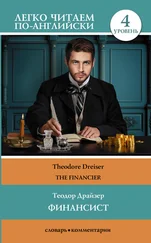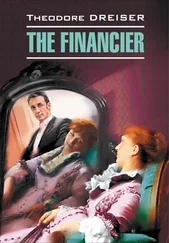Theodore Dreiser - The Financier
Здесь есть возможность читать онлайн «Theodore Dreiser - The Financier» весь текст электронной книги совершенно бесплатно (целиком полную версию без сокращений). В некоторых случаях можно слушать аудио, скачать через торрент в формате fb2 и присутствует краткое содержание. Жанр: Классическая проза, на английском языке. Описание произведения, (предисловие) а так же отзывы посетителей доступны на портале библиотеки ЛибКат.
- Название:The Financier
- Автор:
- Жанр:
- Год:неизвестен
- ISBN:нет данных
- Рейтинг книги:5 / 5. Голосов: 1
-
Избранное:Добавить в избранное
- Отзывы:
-
Ваша оценка:
- 100
- 1
- 2
- 3
- 4
- 5
The Financier: краткое содержание, описание и аннотация
Предлагаем к чтению аннотацию, описание, краткое содержание или предисловие (зависит от того, что написал сам автор книги «The Financier»). Если вы не нашли необходимую информацию о книге — напишите в комментариях, мы постараемся отыскать её.
The Financier — читать онлайн бесплатно полную книгу (весь текст) целиком
Ниже представлен текст книги, разбитый по страницам. Система сохранения места последней прочитанной страницы, позволяет с удобством читать онлайн бесплатно книгу «The Financier», без необходимости каждый раз заново искать на чём Вы остановились. Поставьте закладку, и сможете в любой момент перейти на страницу, на которой закончили чтение.
Интервал:
Закладка:
Hibbs, hearing his voice and seeing him in the door, arose and came over. He was an interesting youth of the collegiate type, educated at Princeton. He had heard the rumor concerning Aileen from various sources—other members of the club, for one—and had ventured to repeat it in Pethick’s presence.
“What’s that you were just saying about my sister?” asked Callum, grimly, looking Hibbs in the eye.
“Why—I—” hesitated Hibbs, who sensed trouble and was eager to avoid it. He was not exceptionally brave and looked it. His hair was straw-colored, his eyes blue, and his cheeks pink. “Why—nothing in particular. Who said I was talking about her?” He looked at Pethick, whom he knew to be the tale-bearer, and the latter exclaimed, excitedly:
“Now don’t you try to deny it, Hibbs. You know I heard you?”
“Well, what did I say?” asked Hibbs, defiantly.
“Well, what did you say?” interrupted Callum, grimly, transferring the conversation to himself. “That’s just what I want to know.”
“Why,” stammered Hibbs, nervously, “I don’t think I’ve said anything that anybody else hasn’t said. I just repeated that some one said that your sister had been very friendly with Mr. Cowperwood. I didn’t say any more than I have heard other people say around here.”
“Oh, you didn’t, did you?” exclaimed Callum, withdrawing his hand from his pocket and slapping Hibbs in the face. He repeated the blow with his left hand, fiercely. “Perhaps that’ll teach you to keep my sister’s name out of your mouth, you pup!”
Hibbs’s arms flew up. He was not without pugilistic training, and he struck back vigorously, striking Callum once in the chest and once in the neck. In an instant the two rooms of this suite were in an uproar. Tables and chairs were overturned by the energy of men attempting to get to the scene of action. The two combatants were quickly separated; sides were taken by the friends of each, excited explanations attempted and defied. Callum was examining the knuckles of his left hand, which were cut from the blow he had delivered. He maintained a gentlemanly calm. Hibbs, very much flustered and excited, insisted that he had been most unreasonably used. The idea of attacking him here. And, anyhow, as he maintained now, Pethick had been both eavesdropping and lying about him. Incidentally, the latter was protesting to others that he had done the only thing which an honorable friend could do. It was a nine days’ wonder in the club, and was only kept out of the newspapers by the most strenuous efforts on the part of the friends of both parties. Callum was so outraged on discovering that there was some foundation for the rumor at the club in a general rumor which prevailed that he tendered his resignation, and never went there again.
“I wish to heaven you hadn’t struck that fellow,” counseled Owen, when the incident was related to him. “It will only make more talk. She ought to leave this place; but she won’t. She’s struck on that fellow yet, and we can’t tell Norah and mother. We will never hear the last of this, you and I—believe me.”
“Damn it, she ought to be made to go,” exclaimed Callum.
“Well, she won’t,” replied Owen. “Father has tried making her, and she won’t go. Just let things stand. He’s in the penitentiary now, and that’s probably the end of him. The public seem to think that father put him there, and that’s something. Maybe we can persuade her to go after a while. I wish to God we had never had sight of that fellow. If ever he comes out, I’ve a good notion to kill him.”
“Oh, I wouldn’t do anything like that,” replied Callum. “It’s useless. It would only stir things up afresh. He’s done for, anyhow.”
They planned to urge Norah to marry as soon as possible. And as for their feelings toward Aileen, it was a very chilly atmosphere which Mrs. Butler contemplated from now on, much to her confusion, grief, and astonishment.
In this divided world it was that Butler eventually found himself, all at sea as to what to think or what to do. He had brooded so long now, for months, and as yet had found no solution. And finally, in a form of religious despair, sitting at his desk, in his business chair, he had collapsed—a weary and disconsolate man of seventy. A lesion of the left ventricle was the immediate physical cause, although brooding over Aileen was in part the mental one. His death could not have been laid to his grief over Aileen exactly, for he was a very large man—apoplectic and with sclerotic veins and arteries. For a great many years now he had taken very little exercise, and his digestion had been considerably impaired thereby. He was past seventy, and his time had been reached. They found him there the next morning, his hands folded in his lap, his head on his bosom, quite cold.
He was buried with honors out of St. Timothy’s Church, the funeral attended by a large body of politicians and city officials, who discussed secretly among themselves whether his grief over his daughter had anything to do with his end. All his good deeds were remembered, of course, and Mollenhauer and Simpson sent great floral emblems in remembrance. They were very sorry that he was gone, for they had been a cordial three. But gone he was, and that ended their interest in the matter. He left all of his property to his wife in one of the shortest wills ever recorded locally.
“I give and bequeath to my beloved wife, Norah, all my property of whatsoever kind to be disposed of as she may see fit.”
There was no misconstruing this. A private paper drawn secretly for her sometime before by Butler, explained how the property should be disposed of by her at her death. It was Butler’s real will masquerading as hers, and she would not have changed it for worlds; but he wanted her left in undisturbed possession of everything until she should die. Aileen’s originally assigned portion had never been changed. According to her father’s will, which no power under the sun could have made Mrs. Butler alter, she was left $250,000 to be paid at Mrs. Butler’s death. Neither this fact nor any of the others contained in the paper were communicated by Mrs. Butler, who retained it to be left as her will. Aileen often wondered, but never sought to know, what had been left her. Nothing she fancied—but felt that she could not help this.
Butler’s death led at once to a great change in the temper of the home. After the funeral the family settled down to a seemingly peaceful continuance of the old life; but it was a matter of seeming merely. The situation stood with Callum and Owen manifesting a certain degree of contempt for Aileen, which she, understanding, reciprocated. She was very haughty. Owen had plans of forcing her to leave after Butler’s death, but he finally asked himself what was the use. Mrs. Butler, who did not want to leave the old home, was very fond of Aileen, so therein lay a reason for letting her remain. Besides, any move to force her out would have entailed an explanation to her mother, which was not deemed advisable. Owen himself was interested in Caroline Mollenhauer, whom he hoped some day to marry—as much for her prospective wealth as for any other reason, though he was quite fond of her. In the January following Butler’s death, which occurred in August, Norah was married very quietly, and the following spring Callum embarked on a similar venture.
In the meanwhile, with Butler’s death, the control of the political situation had shifted considerably. A certain Tom Collins, formerly one of Butler’s henchmen, but latterly a power in the First, Second, Third, and Fourth Wards, where he had numerous saloons and control of other forms of vice, appeared as a claimant for political recognition. Mollenhauer and Simpson had to consult him, as he could make very uncertain the disposition of some hundred and fifteen thousand votes, a large number of which were fraudulent, but which fact did not modify their deadly character on occasion. Butler’s sons disappeared as possible political factors, and were compelled to confine themselves to the street-railway and contracting business. The pardon of Cowperwood and Stener, which Butler would have opposed, because by keeping Stener in he kept Cowperwood in, became a much easier matter. The scandal of the treasury defalcation was gradually dying down; the newspapers had ceased to refer to it in any way. Through Steger and Wingate, a large petition signed by all important financiers and brokers had been sent to the Governor pointing out that Cowperwood’s trial and conviction had been most unfair, and asking that he be pardoned. There was no need of any such effort, so far as Stener was concerned; whenever the time seemed ripe the politicians were quite ready to say to the Governor that he ought to let him go. It was only because Butler had opposed Cowperwood’s release that they had hesitated. It was really not possible to let out the one and ignore the other; and this petition, coupled with Butler’s death, cleared the way very nicely.
Читать дальшеИнтервал:
Закладка:
Похожие книги на «The Financier»
Представляем Вашему вниманию похожие книги на «The Financier» списком для выбора. Мы отобрали схожую по названию и смыслу литературу в надежде предоставить читателям больше вариантов отыскать новые, интересные, ещё непрочитанные произведения.
Обсуждение, отзывы о книге «The Financier» и просто собственные мнения читателей. Оставьте ваши комментарии, напишите, что Вы думаете о произведении, его смысле или главных героях. Укажите что конкретно понравилось, а что нет, и почему Вы так считаете.










